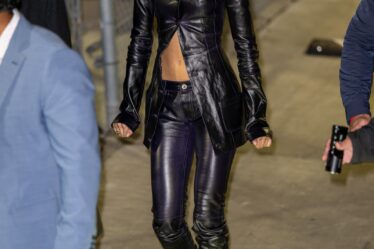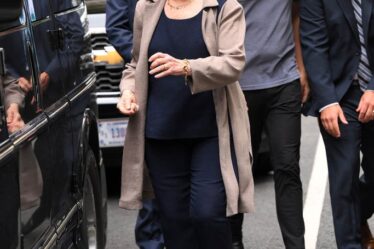If being name-checked by a buzzy rapper is a barometer for a brand’s relevance, True Religion has never lost its grip.
Back in 2008, when its horseshoe logo was synonymous with the decade’s premium denim boom, the brand received nods from Drake and Kendrick Lamar, as well as Chingy and Soulja Boy. In the 2010s, callouts came courtesy of Chief Keef, 2 Chainz (who named a whole mixtape after the brand in 2011), 50 Cent and others. (Technically, the first major reference to True Religion in a song was Black Eyed Peas’ “My Humps”; which genre they fall into is disputed to this day.)
By the time Travis Scott rapped “Stack on black as True Religion” in his song Quintana Pt. 2 in 2014, the brand’s sales were declining and losses mounting. Denim fell out of favour, and e-commerce hit the brand’s dozens of brick-and-mortar stores hard. The company filed for bankruptcy in 2017, and again in 2020, after the pandemic derailed a turnaround plan.
But even as suburban teens moved on — piling into athleisure or buying lower-priced jeans from brands like Levi’s and Abercrombie & Fitch — rappers never seemed to shake their affinity for the horseshoe logo and signature thick stitching.
In the 2020s, True Religion popped up in lyrics from Doja Cat, Latto and Sexyy Red. “True Religion, I feel like a stallion, horseshoes on my ass (Woo),” recites Memphis, Tennessee, rapper Glorilla in her signature country twang on “Accent” by Megan Thee Stallion, released just last month.
That cultural cred — and a post-bankruptcy plan that slashed prices for the brand’s jeans to about $100 — is starting to pay off. Sales increased by about 20 percent to $280 million last year, with $80 million in earnings before interest, taxes, depreciation and amortisation.
True Religion has never shied away from its connection with rap music, but these days the brand is making a markedly concerted effort to solidify its bond with urban culture. In the past year alone, it has inked partnerships with Saweetie, Chief Keef, Moneybagg Yo and NLE Choppa. The brand’s marketing team is keeping a close eye on who’s talking about True Religion in hopes of leveraging that organic attention and building marketing campaigns and collaborations around select hip-hop artists and other influencers, said chief marketing officer Kristen D’Arcy, who was brought on last year to steer its strategy. (True Religion defines influencers as musicians, stylists, athletes, actors and actresses, as well as social-media content creators.)
Last month, a few members of True Religion’s marketing team were on the ground at Angie’s BBQ, an event hosted by hip-hop radio disc jockey Angie Martinez that has become a mainstay in New York’s urban culture scene. True Religion opted to sponsor the event in support of Saweetie, who starred in its spring 2024 campaign and was headlining the concert segment, D’Arcy said.

At the event, several hip-hop artists visited True Religion’s VIP gifting station, including rapper Joe Budden, who quickly swapped the t-shirt he was wearing for a baby-blue True Religion shirt from the clothing rack. The gifting area, accessible only to the event’s VIPs — like Remy Ma, Normani, Lola Brooke and others — was emptied by the time a PR rep for Jadakiss came by to request a bag for the New York legend. An eagle-eyed True Religion marketing team member swooped in to assure Jadakiss’ team they would take care of him, The Business of Fashion observed.
“We are a brand that’s been around for 22 years, and really has always been rooted in the urban casual consumer,” said D’Arcy, whose resumé includes stops at Ralph Lauren, Coty and Oscar de la Renta. “I think the number one thing we do differently is that we build really long-standing relationships with our partners.”
Crafting Full-Circle Moments
True Religion has three types of partnerships with influencers: face of collection, face of campaigns and design collaborations. More often than not, the collaborators it selects have a history of wearing or tagging the brand on social media and/or mentioning it in their music, D’Arcy said.
True Religion’s collaboration last month with Chief Keef, a drill rap pioneer from Chicago’s South Side who released the song “True Religion Fein” in 2012 (sans any formal affiliation with the company), is an example of the kind of “full-circle moments,” D’Arcy said the company looks to orchestrate.

“He rapped about us in 2012, we leaned into him and wanted to show him love in return,” she said. “In 2020, he was the face of a campaign. We then extended that further, brought him back just last month … to do a full blown collection that he himself designed.”
Rapper Quavo, the face of True Religion’s 2023 men’s holiday campaign, sports a tattoo of the brand’s horseshoe logo he received years before he ever had a conversation with its marketing team. Rapper 2 Chainz named his mixtape “T.R.U. REALigion” after the label a decade prior to unveiling a partnership in 2021.
In a couple of weeks, True Religion will debut its 22nd-anniversary campaign starring 21-year-old, Memphis-born rapper NLE Choppa, marking another full-circle moment for both the brand and the music artist.
NLE Choppa, who starred in his first campaign for the brand last year, can trace his affinity for True Religion back to the time he changed schools around 5th or 6th grade. He went from wearing a uniform every day to having to wear his own clothes and was drawn to the trendy (and pricey) brands worn by some of his peers.
“True Religion was the first one that I always wanted to get my hands on,” he said. “So I started hustling to try to get money to be able to buy True Religion.”

Connecting With Culture in the Digital Age
One of the biggest reasons brands struggle generally to find genuine collaborators is that they “fall into the trap of trends,” said Jamie Wachlarz, chief marketing officer of Estate Five Media, an influencer-talent agency. In practice, this means brands clamour for the attention and endorsement of the buzziest celebrity of the moment, hoping to reap the rewards of that association.
But this can backfire when there’s no true brand connection, especially in urban culture, where consumers and hip-hop aficionados are quick to sniff out pandering.
“It can be perceived by the community that the brand is just trying to ‘catch a dollar’ and co-opt a culture because they think Black people are an easy target and will just buy everything,” said Samantha Edwards, co-founder and chief creative officer of digital-marketing agency The Charles Group.

True Religion’s marketing efforts resonate because the brand focuses on “understanding the culture and the community” rather than defaulting to the biggest star of the moment, Edwards said.
“Just based on the artists that they’re working with — they’re not all necessarily mainstream,” she added. “They’ve got someone on their marketing team that really understands it.”
It’s an effective approach but one that some brands avoid because it requires extensive research and vetting of potential partners, Wachlarz said.
“It’s a lot of work,” she said. “You have to dig through and find the organic mentions and then vet them to make sure that there is a true brand fit and that it still aligns with whatever the current initiative is.”
True Religion will build on its strategy this month with the launch of Team True, a community of content creators whom the brand will outfit and engage for ideas on everything from potential campaign faces to design aesthetics, D’Arcy said. The community, comprising 21 personalities such as social-media influencer India Love, track-and-field athlete Nyree Brown and filmmaker and music producer Cordell Broadus (son of rap legend Snoop Dogg), officially launches Aug. 1, though the brand has been working with some members for over a year.
“They serve as a sounding board and a customer panel,” she said. “It’s just this bastion of creative ideas that are directly tied to the urban, casual consumer and that culture.
True Religion’s long-term success — and efficiency — is also contingent upon the diversity of key decision makers on internal teams, experts say.
“When I look at the marketing team, 75 percent internally are non-Caucasian employees,” D’Arcy said. “And so what’s really interesting about that is you are getting different points of view, literally all day long.”
After True Religion unveils its campaign featuring NLE Choppa this month, the rapper says he’s hoping he’ll be invited back to explore a deeper collaboration — something that allows him to dabble in product design.
“It’s just beautiful how you can show love to someone unintentionally, not even knowing that, a few years later, the love is going to be shown back times 10,” he said. “Just having that full circle moment is just beautiful to me for real.”



